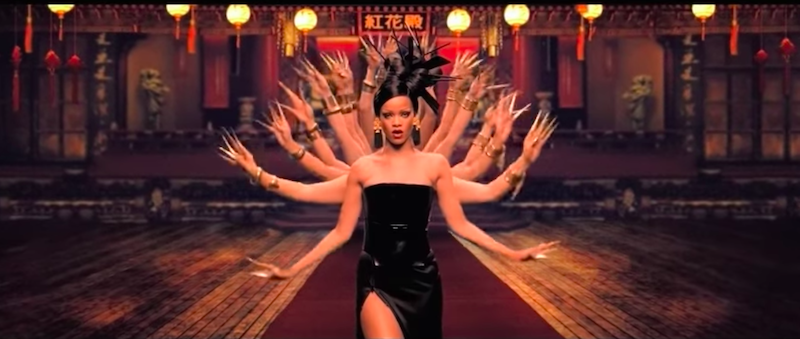The beloved Fenty Beauty just found itself in the line of fire after the brand released two new drool-worthy Killawatt highlighters. The brand has been on an exhilarating product release spree to get us all glowing for spring and summer. Now fans are calling cut on a very controversial shade name.
We may never know how this product name slipped by the typically inclusive and non-problematic Fenty Beauty squad, but it certainly did. Thankfully, Fenty Beauty moved fairly quickly to fix the issue. Still, fans are side-eyeing this highlighter shade name in addition to Rihanna's past appropriation of Asian cultures.
When Fenty Beauty revealed that we would be getting two new Killawatt Foil highlighters, we could not help but salivate.
If you thought Rihanna was stopping at the new Trophy Wife shade of Body Lava ($59, Sephora), then think again! She announced that two new shades would be joining the lineup of Killawatt Foil highlighters ($36, Sephora). If there is anyone we can count on for extra glow and shimmer, it's Rihanna. She doesn't miss!
Or does she?
Fans could not overlook the Killawatt Foil Highlighter called "Geisha Chic."
Geisha Chic is very cute. She's a deep wine hue that will pop perfectly on deep skin, per usual with Fenty Beauty. But why is it called Geisha Chic? The term "geisha" is "a Japanese girl or woman who is trained to provide entertaining and lighthearted company especially for a man or a group of men," as described by Merriam-Webster.
People were not happy with Rihanna using the term "geisha" in a product name because it is native to Japanese culture, and she is not Japanese.
"Ummmm? Rihanna… explain why Asian targeted racism gets glossed over, it feels even worse when it’s from another marginalized group."
This is the part where I will say that the term "geisha" is not a derogatory term or racist slur. Rihanna using the term "geisha" in the name of a product she has for sale is insensitive and definitely an example of cultural appropriation, but it is not explicitly racist (yes, there is a difference).
Geishas historically wore bold pink or red blush on top of white makeup, which is likely why Rihanna erroneously named her highlighter after those talented Japanese women.
Where Rihanna went wrong — because she did go wrong — is that she used the term "geisha," but she is not a part of Japanese culture, nor does she do anything (that we can see) to consistently support actual Japanese people who have experienced oppression as people of color.
That's actually the issue with all cultural appropriation claims. Black folks don't take issue with white people wearing cornrows just because. The real issue is that many white people wear cornrows (which are native to black culture), accept credit for what they didn't originate, and meanwhile, fail to support actual black people the way they should. Their wearing cornrows alone is not racist, although it is culturally insensitive.
Racism can and does exist without cultural appropriation and is always based in hate. Meanwhile, cultural appropriation can be done without being based in hate. Both are annoying and need to stop, but it is important for us all to note those differences.
The bottom line is Geisha Chic wasn't the best name for that highlighter, and fans aren't feeling it.
"Geisha Chic Hunny? Really, Miss Fenty? REALLY?" a fan exclaimed on Twitter.
It's important to acknowledge how people feel here. Sure, we live in the age of heightened sensitivity, but some of that is people speaking up for themselves who weren't empowered to do so prior to the digital age. We cannot tell people of a culture that they have no right to be offended or to feel slighted by a brand they support. If people are spending their money on Fenty Beauty and want to make their concerns known, that is their right. More importantly, we should support their concerns because that's what allyship looks like.
Fans also pointed out that this isn't the first time Rihanna has appropriated Japanese culture.
"F[e]nty naming a highlighter Geisha Chic Hunny is a big f****** yikes and this not the first time she’s been racist towards Asians either," one person wrote.
Again, I will iterate that naming a shade after a geisha is not racism, just like naming a shade after an African queen is not racism; it is very insensitive when it isn't your culture, though. The fan is also right that this isn't the first time Rihanna has appropriated Asian culture.
Rihanna wore a traditional hairstyle and top that was meant to mimic Chinese culture in a Coldplay video.
In the video, she also does dance moves that are seemingly meant to be reminiscent of Tai Chi, which is a Chinese martial art form. Additionally, there is a digital image of her with multiple arms, which is meant to be a representation of the Hindu religious figure Parvati. That visual is (hate to say it, Rih) even more ignorant because the song is called "Princess Of China."
Parvati is a Hindu goddess, by the way, worshipped in India and not so much in China. China actually has the world's largest Buddhist population, not Hindu.

We're also not going to let Rihanna bear this responsibility alone; she was featured in a video by Coldplay. That's the same band that did the "Hymn for the Weekend" video with Beyoncé, in which she appropriated Indian garb.
Coldplay? Rihanna? Beyoncé? Let's get this together, y'all. We have to respect other people, especially when we want to be respected.
Thankfully, it does appear that Rihanna is allowing herself to be educated and trying to avoid appropriating other cultures in the future.
Her Fenty Beauty brand pulled Geisha Chic from all websites immediately after fans called it out.
"Due to the feedback on this post, @fentybeauty has decided to completely remove this shade from online and in stores until further notice. We will keep u updated," Trendmood revealed on Instagram. "We appreciate Fenty Beauty’s responsiveness to this matter and applaud the continuous evolution of this amazing beauty community."
Fenty Beauty also privately messaged and apologized to people who took issue with the name!
"We hear you, we have pulled the product until it can be renamed," the brand wrote in a direct message. "We wanted to personally apologize. Thank you so much for educating us."
It's surprising that Fenty Beauty didn't make a public apology, but it's still great that the brand will rename the highlighter.
Yes for more Fenty Beauty fun — sans the cultural appropriation — going forward!




